Key takeaways:
- Work-life balance involves aligning professional responsibilities with personal fulfillment, requiring conscious effort and regular re-evaluation.
- Effective life planning provides a roadmap toward meaningful goals, enhancing emotional clarity and reducing anxiety.
- Setting boundaries, both in terms of time and workspace, is crucial for sustainable work-life balance and personal well-being.
- Prioritizing self-care and creating a flexible schedule can significantly boost productivity and overall happiness.
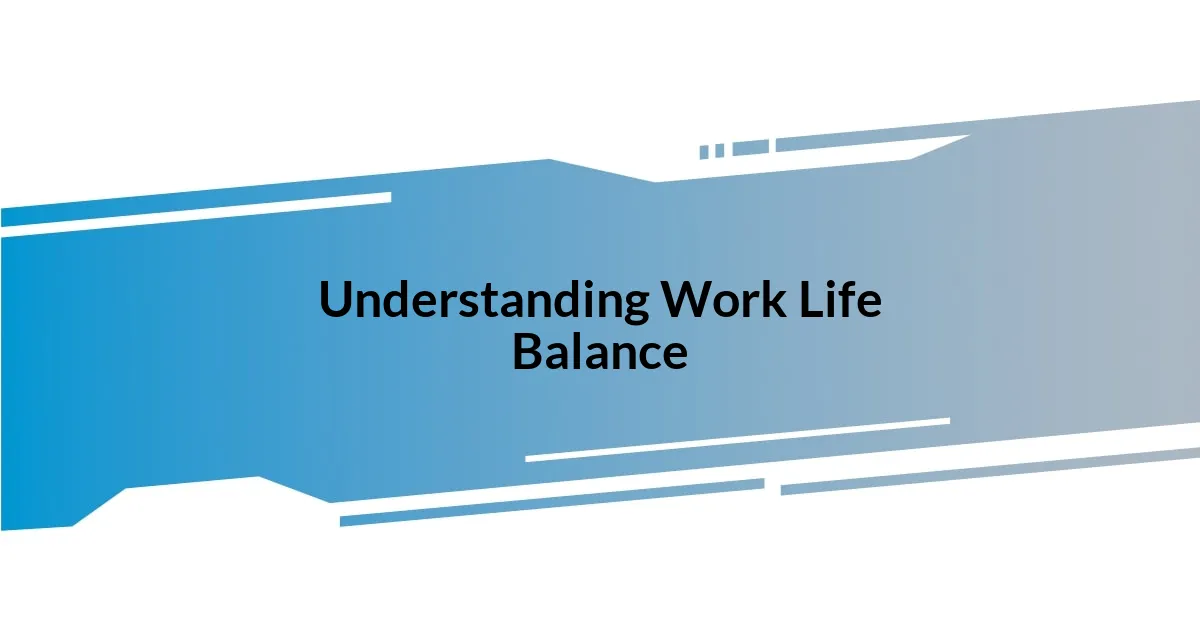
Understanding Work Life Balance
Understanding work-life balance is essential for our overall well-being. I remember a time when I was completely consumed by work, often skipping meals and sacrificing sleep. Reflecting on that period, it’s clear that my productivity plummeted, but I didn’t realize it until I felt burnt out. Have you ever pushed too hard and realized it impacted your happiness?
At its core, work-life balance is about aligning our professional responsibilities with personal fulfillment. I’ve found that carving out time for activities that resonate with me, like hiking or reading, rejuvenates my spirit and enhances my creativity. It’s fascinating how prioritizing personal interests can foster a sense of accomplishment that seeps into my work life, don’t you think?
Finding that sweet spot between work and personal life often feels like a juggling act. I’ve had days where I felt proud of my work achievements, only to come home and realize I missed a family dinner. That moment taught me that true balance requires conscious effort and regular re-evaluation of what matters most. How do you manage those expectations between your responsibilities and what you genuinely enjoy?
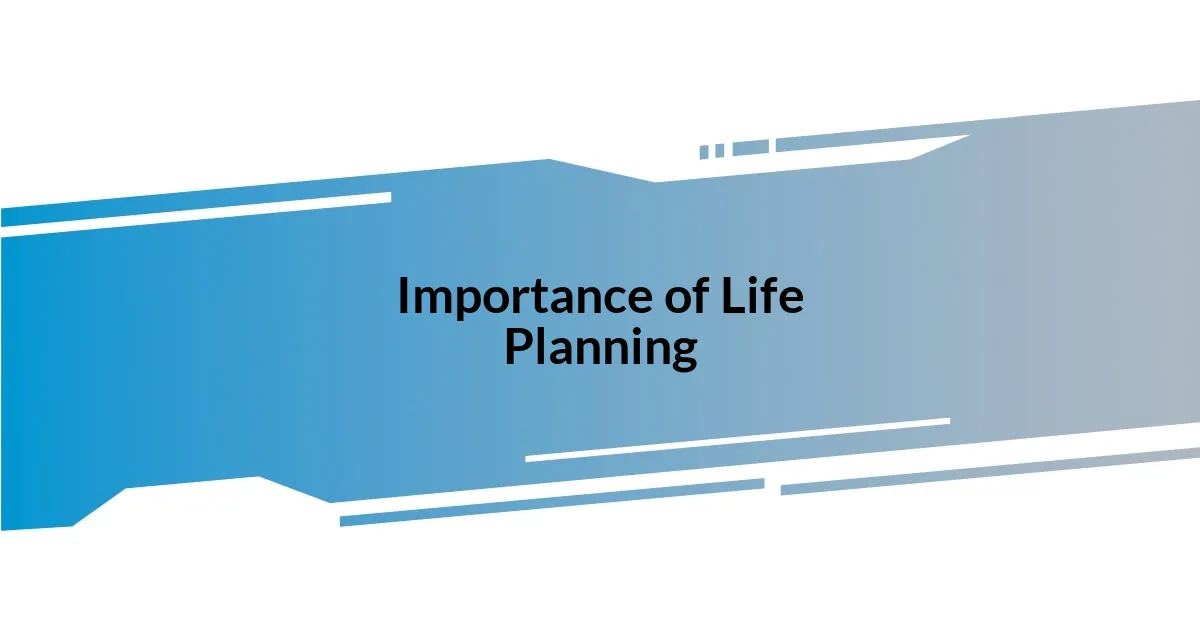
Importance of Life Planning
Planning your life is more than just setting goals; it’s about creating a roadmap that aligns with your values and dreams. I vividly recall a moment when I took the time to reflect on my long-term aspirations. Without a clear plan, I found myself drifting through my days, reacting to demands rather than pursuing what truly mattered. That experience taught me that life planning acts as a guide, steering me towards meaningful achievements instead of allowing distractions to take over.
When I think about the importance of life planning, I often relate it to navigating a ship. Imagine sailing without a destination; you’d end up anywhere, likely feeling lost. I remember discussing this with a mentor who emphasized that having a plan helps you chart your course through rough waters. It’s not just about professional goals; it’s also about enriching personal experiences—like making time for loved ones that I would’ve otherwise overlooked.
Lastly, the emotional clarity that comes from life planning is invaluable. I’ve experienced the chaos of juggling various commitments without a coherent plan. One day, I realized how overwhelmed I felt, and that prompted a shift. By setting specific priorities and timelines, I noticed a significant decrease in my anxiety levels and an increase in my contentment. Life planning isn’t just a task; it’s a commitment to living more fully and deliberately.
| Aspect | Importance |
|---|---|
| Direction | Provides a clear path toward goals |
| Prioritization | Helps identify what truly matters |
| Emotional Well-being | Reduces anxiety and increases satisfaction |
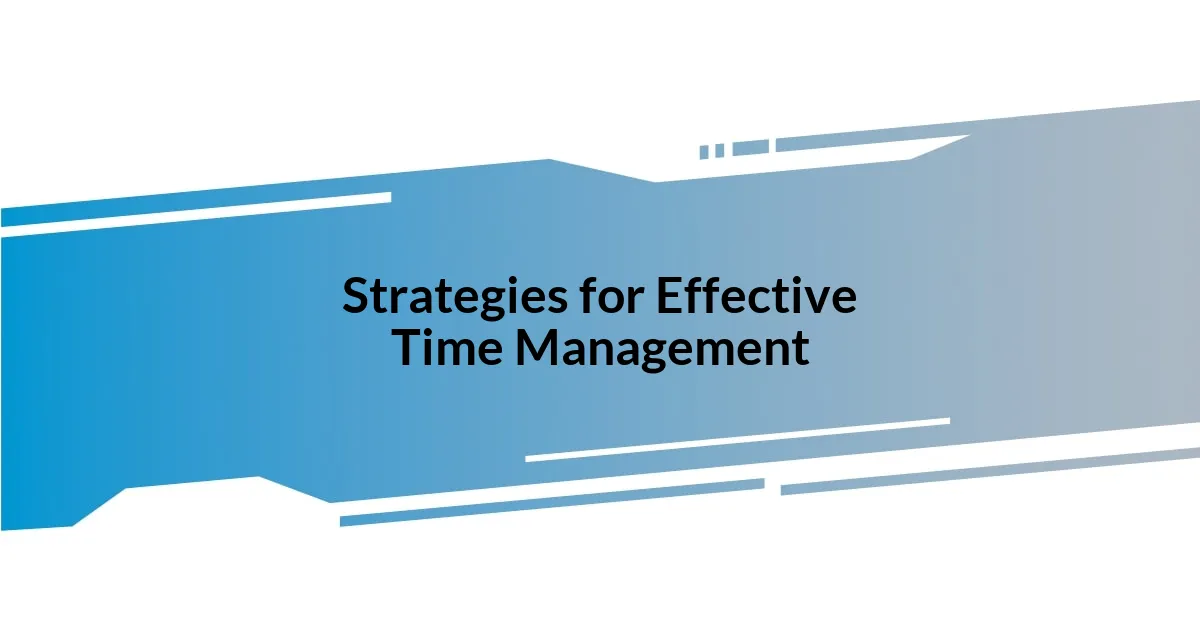
Strategies for Effective Time Management
Effective time management can be transformative, helping to alleviate the overwhelming feeling of juggling multiple responsibilities. I once experienced a chaotic week where I tried to fit in too much, only to find myself frazzled and unproductive. In hindsight, I realized that blocking out specific time slots for tasks—whether they were work assignments or personal activities—allowed me to work more efficiently.
Here are some strategies that can enhance your time management:
- Prioritize Tasks: Identify urgent and important tasks using methods like the Eisenhower Matrix.
- Set Boundaries: Establish specific work hours and communicate them to avoid unnecessary interruptions.
- Utilize Digital Tools: I’ve found apps like Trello or Todoist to be game-changers for organizing tasks visually.
- Implement Time Blocking: Schedule focused periods for work, meetings, and personal time to create distinct boundaries.
- Take Breaks: Regular short breaks energize me, improving concentration and creativity.
Incorporating these strategies has been key to managing my time better. On another note, I remember a period when I neglected my breaks, thinking they’d slow me down. However, once I embraced the practice, I noticed a boost in both my mood and productivity. It’s interesting how a simple pause can recalibrate your mind and refocus your energy, isn’t it?
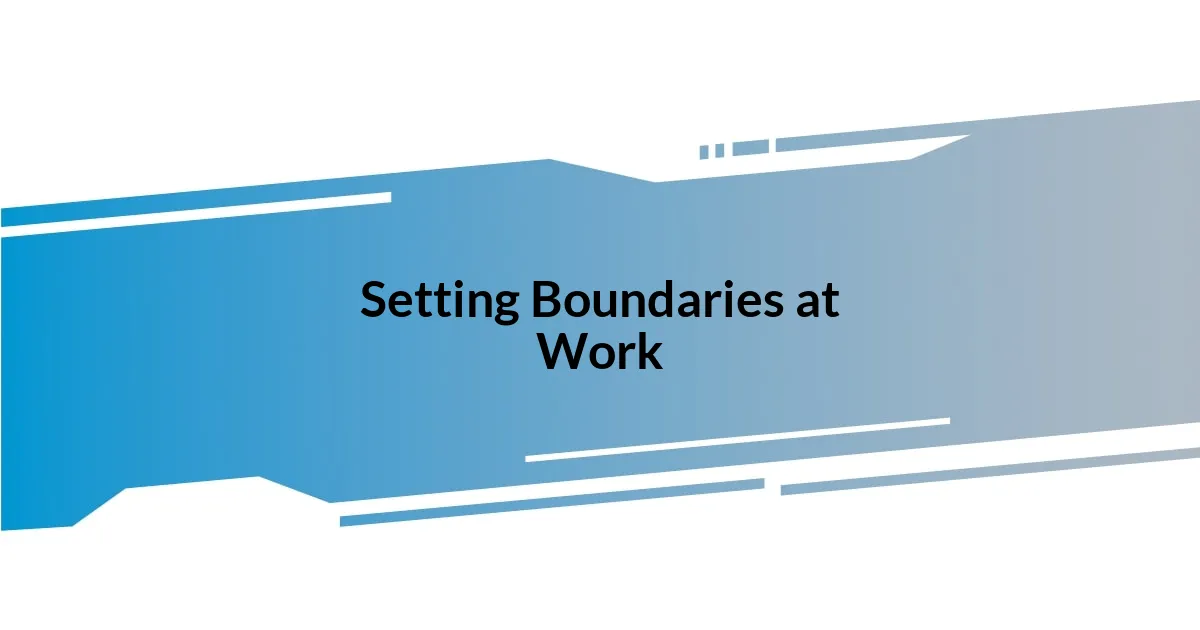
Setting Boundaries at Work
Setting boundaries at work is essential for creating a sustainable balance. I remember a time when I was constantly accessible, responding to emails late into the night. It was exhausting and left me feeling resentful. That experience was my wake-up call. I learned to set clear work hours and stick to them. When I informed my colleagues about my availability, I noticed a shift in how I managed my time and stress levels. No one should feel like they’re tethered to their job 24/7.
Moreover, the importance of saying “no” cannot be overstated. There was a time when I took on every request that came my way, believing it would showcase my commitment. However, I quickly became overwhelmed, leading to burnout. By learning to politely decline tasks that didn’t align with my goals or were beyond my capacity, I safeguarded my energy for what truly mattered. Isn’t it liberating to prioritize your well-being?
Lastly, I’ve found that physical workspace boundaries are equally important. I once worked from my couch, which blurred the lines between work and relaxation. To reclaim my focus, I established a dedicated workspace. This simple change made a world of difference. It’s fascinating how a specific environment can trigger your brain to switch into “work mode.” Have you noticed how a tidy desk can spark productivity? Setting physical boundaries, like a designated space for work, can truly elevate your mindset and efficiency.
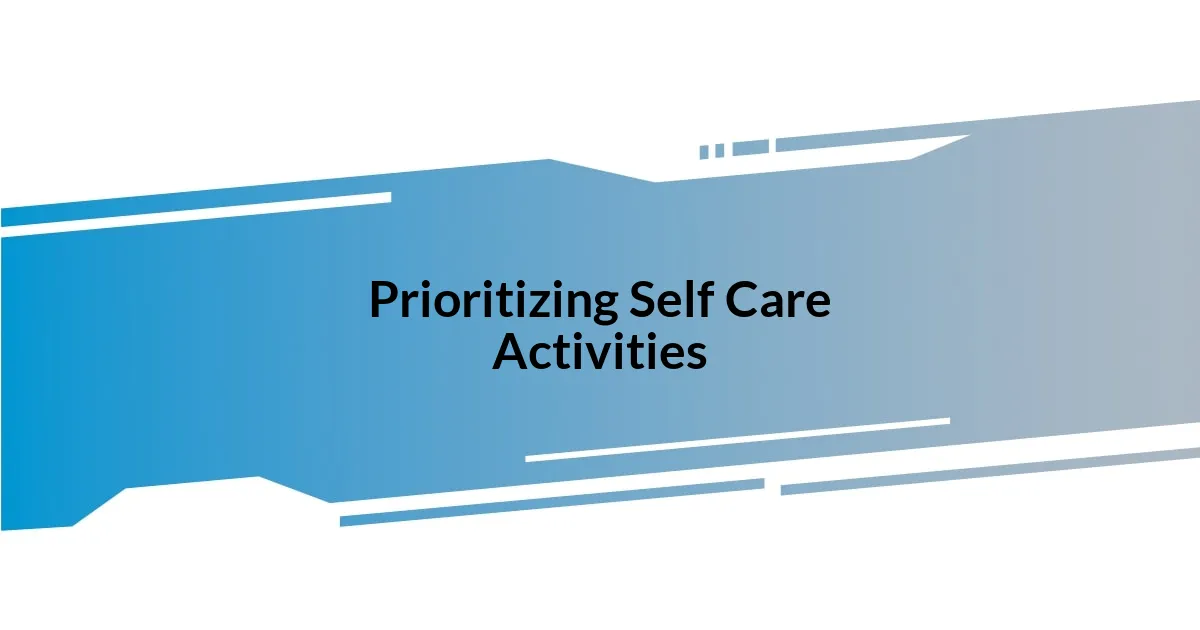
Prioritizing Self Care Activities
Taking the time to prioritize self-care activities is often seen as a luxury, but I believe it’s a necessity. When I allowed myself moments to unwind, whether through a quiet walk in nature or indulging in my favorite book, I found that my overall productivity soared. I remember a particularly challenging week when I finally decided to pause and take a half-hour each day to meditate. It made such a difference; I felt recharged and clearer in my tasks. Have you ever experienced that satisfying clarity after giving yourself a break?
Moreover, incorporating self-care into my daily routine transformed my perspective on well-being. I found that small activities, like preparing a nutritious meal or practicing yoga, not only improved my mood but also enhanced my energy levels. I’ve noticed that when I skip these self-care rituals, I tend to feel drained and irritable. It’s quite telling how neglecting ourselves can creep into every aspect of our lives. Isn’t it puzzling how prioritizing just a few minutes for ourselves can pivot our entire day?
Lastly, I truly believe that self-care is about intentionality, not just occasional indulgences. I learned this while juggling a demanding project schedule; I began to schedule self-care as I would any work meeting. It might sound a bit rigid, but putting it on my calendar meant I couldn’t easily dismiss it. During this time, I saw how creating those appointments for my mental and physical health led to better outcomes in my work. Have you considered treating your well-being with the same importance as your deadlines? It’s a game-changer!
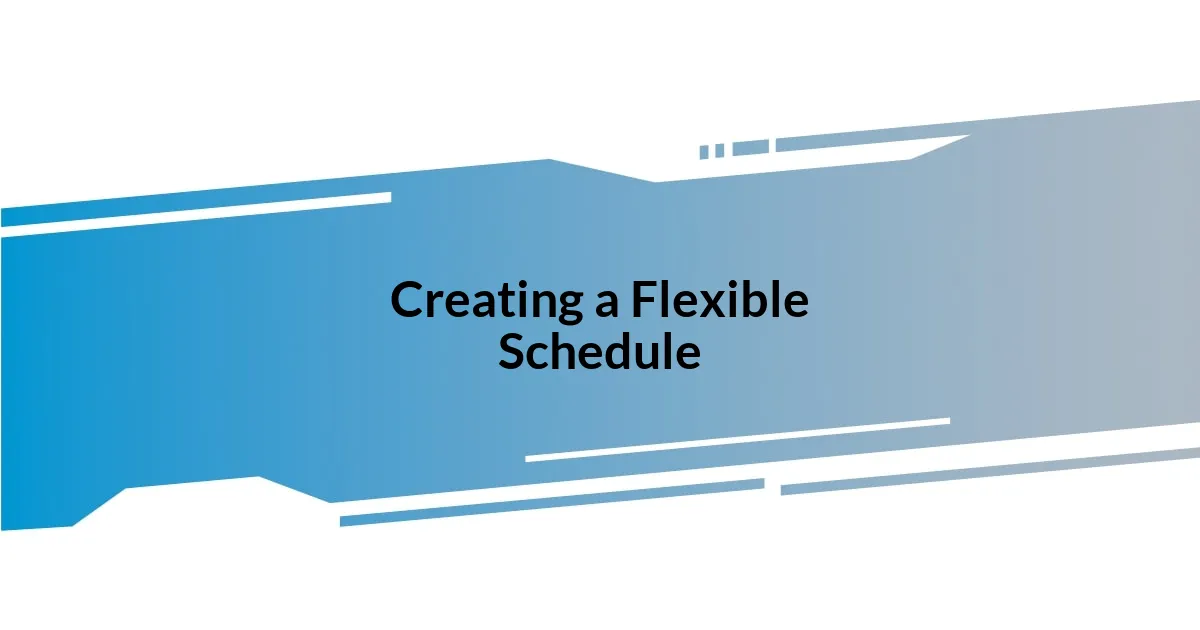
Creating a Flexible Schedule
Creating a flexible schedule has been a game changer for me. Early in my career, I remember the chaos of trying to fit everything into a rigid timetable. I realized that adjusting my work hours based on peak energy times made all the difference. For example, I’m usually more productive in the mornings, so I decided to block off those hours for my most critical tasks. Have you noticed how everyone’s energy levels fluctuate throughout the day?
I also learned the value of incorporating buffer times between tasks. Initially, I too often scheduled back-to-back meetings, which left me frazzled and mentally drained. Now, I keep at least 15-30 minutes between appointments. This small change allows me to recharge and prepare for the next task with a clear mind. Have you felt the stress melt away with just a bit of breathing room?
Finally, I discovered that flexibility doesn’t just apply to hours but also to locations. Some days, I work better from a café where the atmosphere fuels my creativity. Other days, a quiet home office is my haven. By shifting my workspace based on what I need in the moment, I’ve found a rhythm that keeps me engaged and motivated. Have you ever tried working from a new spot just to shake things up? This adaptability can spark fresh ideas and rejuvenate your passion for work.
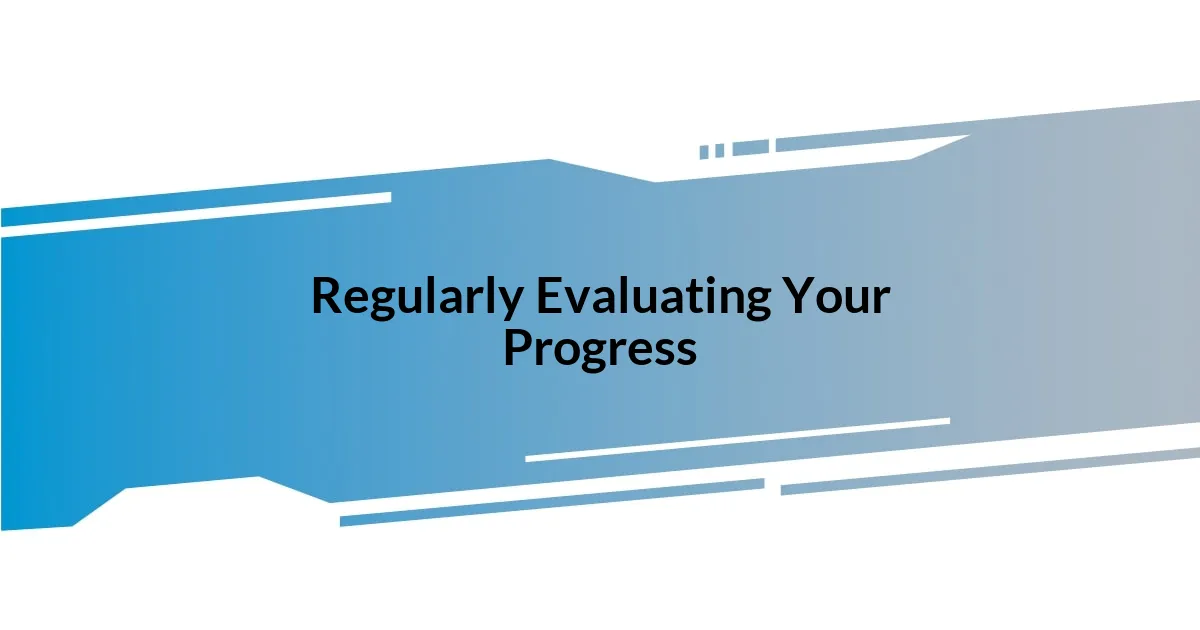
Regularly Evaluating Your Progress
Regularly evaluating my progress has been an enlightening journey. Sometimes, I carve out time weekly to reflect on my goals and achievements. During this exercise, I often ask myself questions like, “Am I moving in the right direction?” and “What obstacles have I faced?” This self-assessment helps me adjust my strategies effectively.
There was a time when I blindly followed my to-do list, only to realize it wasn’t aligned with my long-term vision. After a candid review, I found areas that needed more focus and some tasks that could be eliminated altogether. It’s incredible how taking a step back can reveal insights that propel you forward. Have you ever felt like you were racing toward a finish line only to discover it wasn’t the right race to run?
I also believe in celebrating small victories as part of my evaluation process. After completing a challenging project, I take a moment to recognize my hard work and the lessons learned. This acknowledgment doesn’t just boost my morale; it fosters a positive mindset that encourages continued growth. How often do you pause to appreciate your progress? Doing so can become a powerful motivator on the path to achieving your larger goals.